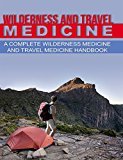Signs of Anaphylaxis and Anaphylaxis Action Plan
Learn the signs of anaphylaxis, the common causes, and an anaphylaxis action plan for treatment.
Anaphylaxis Shock Definition: Anaphylaxis is a very severe allergic reaction. If untreated, it can lead to death. A history of mild reaction does not mean you will never have a severe allergic reaction to the same thing.
GET YOUR EMERGENCY FIRST AID CHEAT SHEET
The information in this post is from the book “Wilderness and Travel Medicine” by Sam Fury.
Wilderness and Travel Medicine is a comprehensive handbook with a minimalist approach. It contains prevention, diagnoses, and treatments for a wide range of ailments using modern and “survival” medicines.
Get Your Copy Today on Kindle and/or in Print
Anaphylaxis Causes, Diagnosis, and Treatment
IMPORTANT: No amount of reading can compare to a medical course with a professional trainer. A standard first aid course is good. A Remote Area First Aid Course or higher is best.
Causes of Anaphylaxis
Drugs: Common ones include anesthetics, antibiotics, x-ray dyes, heart and blood pressure medicine, and NSAIDs.
Exercise: Refered to as exercise induced anaphylaxis. Often occurs after eating.
Foods: Nuts, fruit, seafood etc.
Insect Stings: Bees, wasps etc.
Latex: Rubber gloves, condoms etc.
There are also many unknown causes.
Anaphylaxis Reaction Symptoms
Symptoms usually show within minutes of exposure. The faster you treat it the better. Recurrent reactions can occur within 24 hours of the original episode. Treat these in the same way as the initial reaction.
Abdominal Pain.
Decreased mental state.
Diarrhea.
Dizziness.
Hives.
Itching.
Nausea.
Respiratory problems.
Shock (rapid heart rate, low blood pressure etc.).
Skin-redness.
Swelling of the mouth and face.
Paresthesias (tingling).
Vomiting.
Weakness.
Treatment for Anaphylaxis
Diphenhydramine, e.g., Benadryl: 1 mg/kg of body weight, maximum of 50 mg, every 4 to 6 hours. Chewing the pill will make it work faster.
Rescue Breathing or CPR as needed.
Administer epinephrine if:
There is an obvious major reaction, e.g., difficulty breathing, unconsciousness.
A reaction worsens over a few minutes.
If in doubt, administer the epinephrine.
Administer diphenhydramine as soon as able.
Consider a corticosteroid, e.g., prednisone
Observe for at least 24 hours in case of a secondary reaction.
Dosages of Drugs used to Treat Anaphylaxis
Epinephrine: 0.01 ml/kg of body weight, maximum of 0.3 ml. You can repeat injections every 5 minutes if needed.
Prednisone: 1 mg/kg of body weight, maximum of 60 mg, once a day.
LEARN MORE WILDERNESS FIRST AID
How to Administer Epinephrine
The easiest way to do this is with a commercial injector, e.g., EpiPen. Patients that have a history of anaphylaxis should carry these with them. It is a good idea to have one in your first aid kit. They are usually allowed on planes.
The instructions on how to use an EpiPen are on them. Exact usage varies. Remove the cap and press it into the patient’s thigh.
There is no need to stab the patient with it. That will cause unnecessary bruising and pain.
Do not put your finger or thumb on the top of the device. This ensures you do not inject yourself by accident.
You can also give epinephrine with a normal syringe.
EMERGENCY FIRST AID CHEAT SHEET

Wilderness and Travel Medicine: A Complete Wilderness Medicine and Travel Medicine Handbook (Escape, Evasion, and Survival 4)

Price Disclaimer
Image Credit: By BruceBlaus. Blausen.com staff (2014). “Medical gallery of Blausen Medical 2014”. WikiJournal of Medicine 1 (2). DOI:10.15347/wjm/2014.010. ISSN 2002-4436. (Own work) [CC BY 3.0], via Wikimedia Commons
Did you find this article about anaphylaxis causes, diagnosis, and treatment useful? If so, please share it with your friends.
The post Signs of Anaphylaxis and Anaphylaxis Action Plan appeared first on Survival Fitness Plan.





